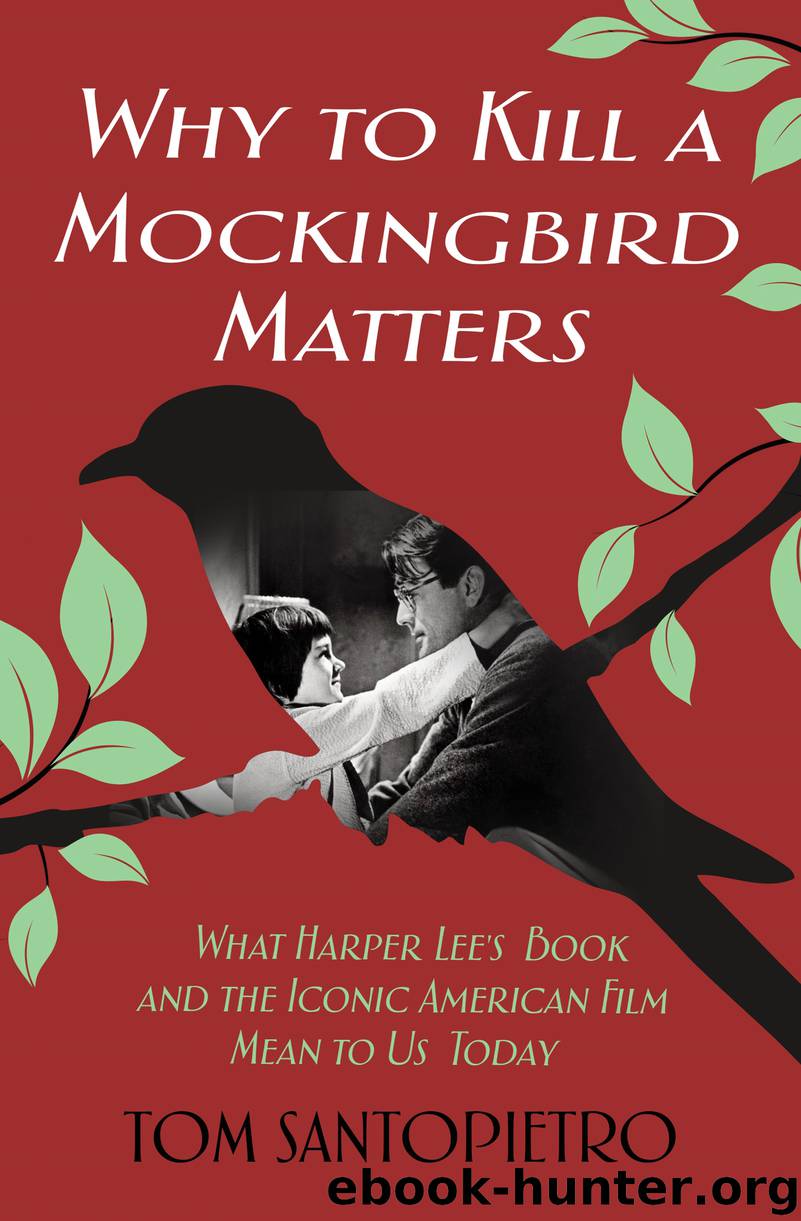Why to Kill a Mockingbird Matters by Tom Santopietro

Author:Tom Santopietro
Language: eng
Format: epub
Publisher: St. Martin's Press
12
IS TO KILL A MOCKINGBIRD RACIST?
To Kill a Mockingbird’s publication made invisible the very people it claimed to care about.
—Colin Dayan of Al Jazeera America at the time of Go Set a Watchman’s 2015 publication
Although a small but persistent core of criticism questioning whether To Kill a Mockingbird was racist began to raise its head as the popularity of the book and film grew, the novel had powerful and influential fans within the African-American community, chief among them the Reverend Dr. Martin Luther King, Jr. Said Dr. King, “To the Negro in 1963, as to Atticus Finch, it had become obvious that nonviolence could symbolize the gold badge of heroism rather than the white feather of cowardice.” In Atticus Finch, Dr. King had recognized a kindred spirit, another man who believed in “the strength of moral force.” Dr. King’s viewpoint was echoed by Andrew Young, a leader of the civil rights movement and future ambassador to the United Nations, who similarly explained, “To Kill a Mockingbird is a book that inspires hope in the midst of chaos and confusion. And those kinds of books last for a long time.”
But, as pointed out by Mary Tucker, who taught school in Monroeville, both before and after desegregation, many black people, even in Nelle’s hometown, professed no interest in reading the book, and those who did oftentimes disliked it, their list of reasons beginning with their fervent objection to the use of the “N word.” Further critics of Mockingbird called the lessons of the book simplistic, arguing that by setting the book in a past three decades removed from the civil rights turmoil of the 1960s, Harper Lee had let American readers off the hook, allowing them to tell themselves with smug certainty, “I would never say or do such horrible things.”
Did the book display a “great white father” attitude in which, out of a misguided sense of noblesse oblige, the material soothed rather than challenged? Was the book popular because it presented a fairy tale–like leading man who reassured white readers? Indeed, was Atticus Finch yet another iteration of a white man riding into town to save the poor black man who can’t help himself? Where, critics asked, were any of the black men and women who consistently put their lives on the line in order to combat segregation? In truth, they were nowhere in sight, a fact that lends the book a sense of imbalance—but then again, that was not the story Harper Lee chose to tell.
Was Atticus just another example of worn-out liberal pieties and excuses? Particularly in the movie, if one looks closely at the town of Maycomb, aside from Bob Ewell there doesn’t appear to be another individual racist in town. A mob at the jail, yes, but a fully differentiated individual? No. Just as The Sound of Music, set at the time of the Anschluss, barely showed any Nazis (and those depicted never seemed to carry guns), it can be argued that in the entire town of Maycomb, Bob Ewell seems to be the one and only racially insensitive individual on hand.
Download
This site does not store any files on its server. We only index and link to content provided by other sites. Please contact the content providers to delete copyright contents if any and email us, we'll remove relevant links or contents immediately.
| Anthropology | Archaeology |
| Philosophy | Politics & Government |
| Social Sciences | Sociology |
| Women's Studies |
Nudge - Improving Decisions about Health, Wealth, and Happiness by Thaler Sunstein(7707)
The Fire Next Time by James Baldwin(5446)
iGen by Jean M. Twenge(5416)
Adulting by Kelly Williams Brown(4574)
The Sports Rules Book by Human Kinetics(4388)
The Hacking of the American Mind by Robert H. Lustig(4383)
The Ethical Slut by Janet W. Hardy(4253)
Captivate by Vanessa Van Edwards(3840)
Mummy Knew by Lisa James(3693)
In a Sunburned Country by Bill Bryson(3542)
The Worm at the Core by Sheldon Solomon(3487)
Ants Among Elephants by Sujatha Gidla(3467)
The 48 laws of power by Robert Greene & Joost Elffers(3291)
Suicide: A Study in Sociology by Emile Durkheim(3023)
The Slow Fix: Solve Problems, Work Smarter, and Live Better In a World Addicted to Speed by Carl Honore(3009)
The Tipping Point by Malcolm Gladwell(2925)
Humans of New York by Brandon Stanton(2873)
Get What's Yours for Medicare: Maximize Your Coverage, Minimize Your Costs by Philip Moeller(2736)
Handbook of Forensic Sociology and Psychology by Stephen J. Morewitz & Mark L. Goldstein(2705)
